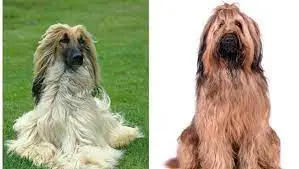Is Your Bernedoodle Prone to Eye Problems? Here’s What You Need to Know
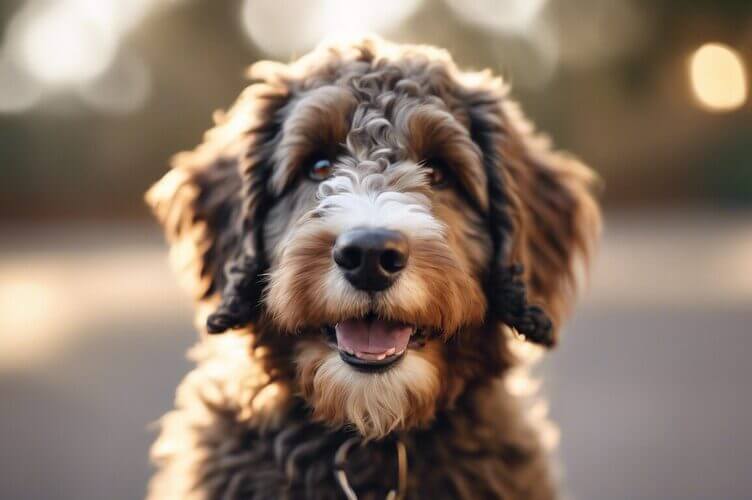
Bernedoodles, with their adorable teddy bear faces and playful personalities, have become one of the most popular dog breeds in recent years. While generally healthy, Bernedoodles, like all dogs, can be susceptible to certain health concerns, including Bernedoodle eye problems.
This article aims to educate Bernedoodle owners and potential owners about these potential eye issues and how to keep your furry friend’s vision clear and bright.
“The eyes are the window to our soul,” as Hippocrates once said.
This saying holds particular importance when it comes to our canine companions. By understanding the signs and symptoms of Bernedoodle eye problems, you can ensure your Bernedoodle receives timely treatment and maintains optimal vision throughout their life.
Common Bernedoodle Eye Problems
Bernedoodles, due to their mixed heritage of Bernese Mountain Dogs and Poodles, can inherit certain eye conditions from either parent breed. Here’s a breakdown of some of the most common Bernedoodle eye problems:
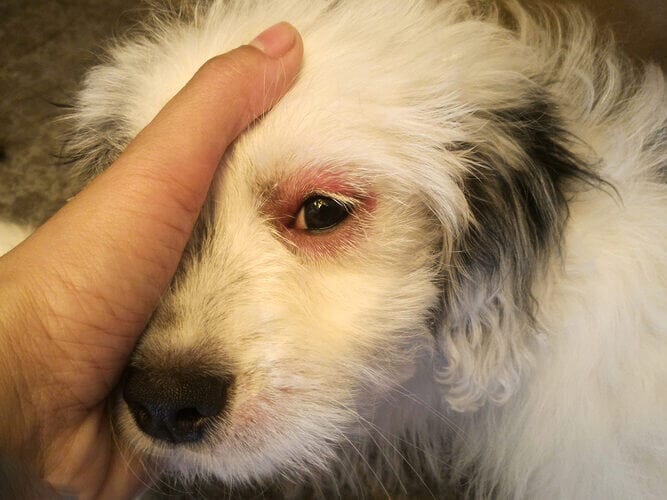
- Cataracts: Cataracts are a clouding of the lens of the eye, which can gradually lead to vision loss. Inheritable cataracts can develop in young Bernedoodles, sometimes within a few months of birth. Later-onset cataracts can also occur in older Bernedoodles. Signs of cataracts include cloudiness in the eye, squinting, and bumping into objects.
- Entropion: Entropion occurs when the eyelid folds inward, causing the eyelashes to rub against the cornea (the clear surface of the eye). This constant irritation can lead to pain, redness, and even vision loss. Entropion is a common concern in Bernedoodle puppies and may require corrective surgery.
- Cherry Eye: Cherry eye is a condition where the tear gland located behind the third eyelid protrudes, appearing as a red, cherry-like mass in the corner of the eye. While not always painful, cherry eye can be unsightly and may cause discomfort. Treatment typically involves surgical repositioning of the gland.
- Dry Eye: Dry eye occurs when the tear glands don’t produce enough tears to lubricate the eye. This can cause irritation, redness, squinting, and discharge. Several factors, including allergies and underlying Bernedoodle health conditions, can contribute to dry eye in Bernedoodles.
- Other Eye Problems: While less common, other potential Bernedoodle eye problems include glaucoma, keratitis (corneal inflammation), and progressive retinal atrophy (degeneration of the retina).
Preventing Bernedoodle Eye Problems
While some Bernedoodle eye problems are hereditary, there are steps you can take to promote your Bernedoodle’s overall eye health:
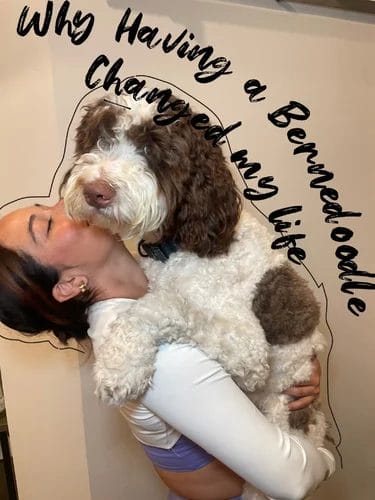
Regular Vet Checkups and Eye Exams: Schedule regular checkups with your veterinarian, including comprehensive eye exams. Early detection and treatment of eye problems can significantly improve the outcome.
Maintaining a Healthy Diet: Providing your Bernedoodle with a high-quality, balanced diet formulated for their breed and age can contribute to overall health, including eye health. When choosing the Best Dog Food for your Bernedoodle, consult your veterinarian for recommendations.
Grooming: For Bernedoodles with long fur around the eyes, regular trims can help prevent irritation from hair poking into the eye.
Avoiding Irritants: Minimize exposure to smoke, dust, and other irritants that can exacerbate eye problems.
Recognizing Allergies: Allergies can contribute to eye irritation and discharge. Be observant of any signs of allergies, such as itchy skin or frequent paw licking, and consult your veterinarian for proper diagnosis and treatment.
When to Take Your Bernedoodle to the Vet
If you notice any of the following signs in your Bernedoodle’s eyes, it’s crucial to schedule an appointment with your veterinarian right away:
- Squinting or excessive blinking
- Redness, swelling, or discharge
- Cloudiness in the eye
- Pawing at the face
- Bumping into objects
Early diagnosis and treatment of Bernedoodle eye problems are essential to prevent vision loss and other complications. The sooner you address any eye concerns, the better the prognosis for your beloved Bernedoodle.
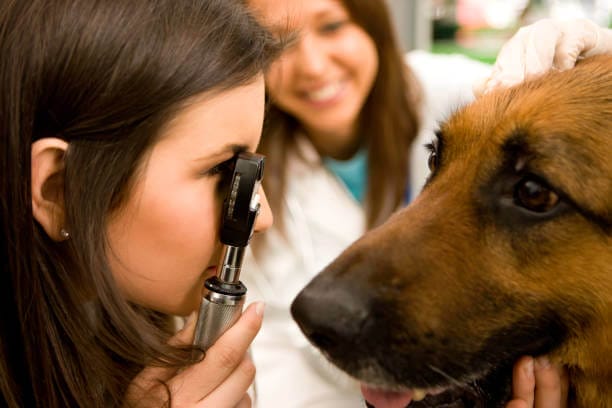
- Responsible Bernedoodle breeders often perform genetic testing on their breeding stock to screen for certain inherited eye conditions.
- Consider enrolling your Bernedoodle in Dog Training classes to promote a well-behaved and trainable companion.
Famous Veterinary Center: The ophthalmology department at the Cornell University College of Veterinary Medicine is a renowned center for treating various eye conditions in dogs, including Bernedoodle eye problems.
- The American Veterinary Medical Association (AVMA): https://www.avma.org/
- The American Animal Hospital Association (AAHA): https://www.aaha.org/
Can eye problems in Bernedoodles be treated?
Treatment for Bernedoodle eye problems depends on the specific condition. Some conditions, like mild dry eye, may be managed with eye drops and medication. Others, like entropion or cataracts, often require surgery for correction. Early diagnosis and intervention are crucial for successful treatment and preserving your Bernedoodle’s vision.
How often should I get my Bernedoodle’s eyes checked?
The frequency of eye exams for your Bernedoodle will depend on their age, breed predisposition, and overall health. Discuss a recommended schedule with your veterinarian. Generally, puppies may require more frequent exams during their first year, while adult Bernedoodles might need annual checkups.
What are some home remedies for minor eye irritation in Bernedoodles?
For minor eye irritation, such as occasional dust or pollen exposure, you can gently wipe your Bernedoodle’s eyes with a damp, warm cloth. Avoid using any harsh chemicals or soaps. If the irritation persists, consult your veterinarian to rule out any underlying issues.
Are there any Bernedoodle breeders who test for eye problems?
Responsible Bernedoodle breeders often perform genetic testing on their breeding stock to screen for certain inherited eye conditions, such as cataracts. Ask breeders about their testing practices and any health guarantees they offer.
Dog Care: Providing your Bernedoodle with proper Dog Care, including regular veterinary checkups, a balanced diet, and appropriate exercise, is essential for maintaining their overall health and well-being.
Conclusion
Bernedoodles are wonderful companions, but like all breeds, they can be susceptible to certain health concerns, including Bernedoodle eye problems. By understanding the potential issues, keeping a watchful eye for signs, and prioritizing preventative care, you can help ensure your Bernedoodle enjoys a lifetime of clear vision and happy exploration.
Remember, a healthy Bernedoodle is a happy Bernedoodle!
Petscaretip – How To Care Your Pets
Address: 809 Dallas St, Houston, TX 77002, USA, Houston, TX, United States, Texas
Email: [email protected]






